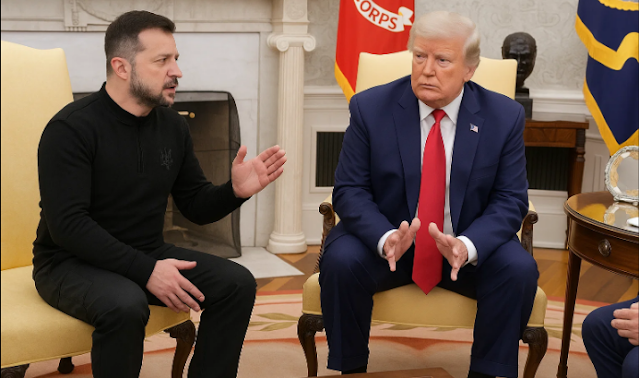In a recent and highly charged meeting at the White House, Ukrainian
President Volodymyr Zelensky and U.S. President Donald Trump engaged in a
heated exchange that has garnered international attention. The encounter,
intended to solidify economic partnerships and address ongoing geopolitical
tensions, instead highlighted deep-seated disagreements and has raised
questions about the future of U.S.-Ukraine relations.
A Tense White House Encounter
On February 28, 2025, Presidents Zelensky and Trump convened in the Oval
Office to discuss a proposed agreement granting the U.S. access to Ukraine’s
rich mineral resources. The meeting quickly devolved into a contentious
debate, with President Trump admonishing Zelensky for what he perceived as a
lack of gratitude for U.S. support. Trump stated, “You are not in a position
to dictate to us how we should feel.” The confrontation escalated to the
point where the scheduled press conference was canceled, and President
Zelensky departed abruptly, leaving the agreement unsigned.
European Leaders Rally Behind Zelensky
The public nature of the dispute prompted swift reactions from the
international community. European leaders expressed solidarity with
President Zelensky, emphasizing their continued support for Ukraine amidst
its ongoing conflict with Russia. The altercation has also intensified
discussions within NATO and the European Union regarding their roles in
ensuring regional stability and supporting Ukraine’s sovereignty.
Zelensky’s Allegations Against Trump’s Cryptocurrency
In the aftermath of the tumultuous meeting, President Zelensky leveled
serious accusations against President Trump, alleging that the former U.S.
president’s recently launched cryptocurrency, known as TRUMP, is a
fraudulent scheme designed to siphon funds from unsuspecting investors.
Zelensky’s claims add to a growing chorus of concerns surrounding the
ethical implications and potential conflicts of interest associated with the
digital currency.
The TRUMP coin, introduced shortly before Trump’s inauguration in January
2025, has been mired in controversy. Critics argue that the cryptocurrency
lacks transparency and may serve as a conduit for Trump and his associates
to receive funds anonymously, potentially circumventing financial
regulations and ethical standards.
Ethical Concerns and Legal Scrutiny
Ethics officials and legal experts have voiced apprehension over the
intertwining of President Trump’s political endeavors with his business
interests. The promotion of a personal cryptocurrency by a sitting president
is unprecedented and raises questions about potential conflicts of interest
and the exploitation of public office for private gain.
Adding to the skepticism, financial analysts have observed significant
volatility in the value of TRUMP coin, with reports indicating substantial
losses for some investors. This volatility has led to allegations that the
cryptocurrency may be a “pump and dump” scheme, enriching insiders at the
expense of the general public.
A Shift in Stance on Digital Currencies
Ironically, during his earlier tenure as president, Trump was a vocal critic
of cryptocurrencies, referring to them as “not money” and expressing
concerns that they could facilitate unlawful behavior. His recent foray into
the digital currency space marks a significant reversal, prompting further
scrutiny of his motivations and the potential implications for investors and
the broader financial system.
Conclusion
The recent confrontations between Presidents Zelensky and Trump, both in
diplomatic settings and over financial ventures, underscore the complexities
of international relations and the ethical considerations of intertwining
public office with private enterprise. As allegations of fraud and
misconduct continue to surface, it remains imperative for global leaders and
institutions to uphold transparency, integrity, and the rule of law in both
political and economic spheres.

